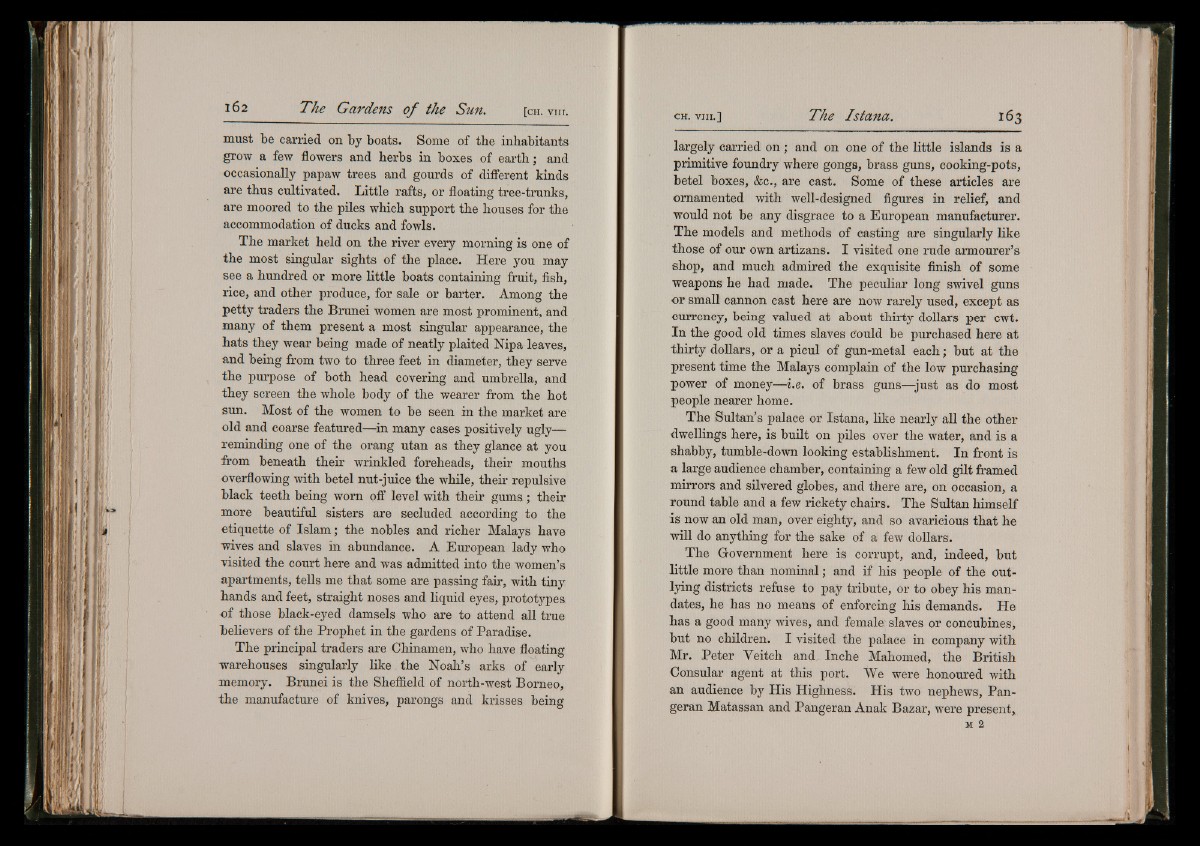
must be carried on by boats. Some of the inhabitants
grow a few flowers and herbs in boxes of earth; and
occasionally papaw trees and gourds of different kinds
are thus cultivated. Little rafts, or floating tree-trunks,
are moored to the piles which support the houses for the
accommodation of ducks and fowls.
The market held on the river every morning is one of
the most singular sights of the place. Here you may
see a hundred or more little boats containing fruit, fish,
rice, and other produce, for sale or barter. Among the
petty traders the Brunei women are most prominent, and
many of them present a most singular appearance, the
hats they wear being made of neatly plaited Nipa leaves,
and being from two to three feet in diameter, they serve
the purpose of both head covering and umbrella, and
they screen the whole body of the wearer from the hot
sun. Most of the women to be seen in the market are
old and coarse featured—in many cases positively ugly—
reminding one of the orang utan as they glance at you
from beneath their wrinkled foreheads, their mouths
overflowing with betel nut-juice the while, their repulsive
black teeth being worn off level with their gums; their
more beautiful sisters are secluded according to the
etiquette of Islam; the nobles and richer Malays have
wives and slaves in abundance. A European lady who
visited the court here and was admitted into the women’s
apartments, tells me that some are passing fair, with tiny
hands and feet, straight noses and liquid eyes, prototypes
o f those black-eyed damsels who are to attend all true
believers of the Prophet in the gardens of Paradise.
The principal traders are Chinamen, who have floating
warehouses singularly like the Noah’s arks of early
memory. Brunei is the Sheffield of north-west Borneo,
the manufacture of knives, parongs and krisses being
largely carried on ; and on one of the little islands is a
primitive foundry where gongs, brass guns, cooking-pots,
betel boxes, &c., are cast. Some of these articles are
ornamented with well-designed figures in relief, and
would not be any disgrace to a European manufacturer.
The models and methods of casting are singularly like
those of our own artizans. I visited one rude armourer’s
shop, and much admired the exquisite finish of some
weapons he had made. The peculiar long swivel guns
or small cannon cast here are now rarely used, except as
currency, being valued at about thirty dollars per cwt.
In the good old times slaves could be purchased here at
thirty dollars, or a picul of gun-metal each; but at the
present time the Malays complain of the low purchasing
power of money—i.e. of brass guns—-just as do most
people nearer home.
The Sultan’s palace or Istana, like nearly all the other
dwellings here, is built on piles over the water, and is a
shabby, tumble-down looking establishment. In front is
a large audience chamber, containing a few old gilt framed
mirrors and silvered globes, and there are, on occasion, a
round table and a few rickety chairs. The Sultan himself
is now an old man, over eighty, and so avaricious that he
will do anything for the sake of a few dollars.
The Government here is corrupt, and, indeed, but
little more than nominal; and if his people of the outlying
districts refuse to pay tribute, or to obey his mandates,
he has no means of enforcing his demands. He
has a good many wives, and female slaves or concubines,
but no children. I visited the palace in company with
Mr. Peter Yeitch and Inche Mahomed, the British
Consular agent at this port. We were honoured with
an audience by His Highness. His two nephews, Pan-
geran Matassan and Pangeran Anak Bazar, were present,
M 2